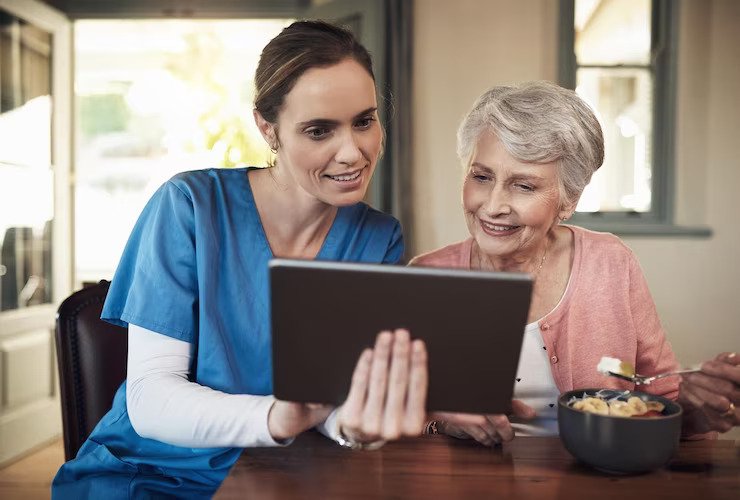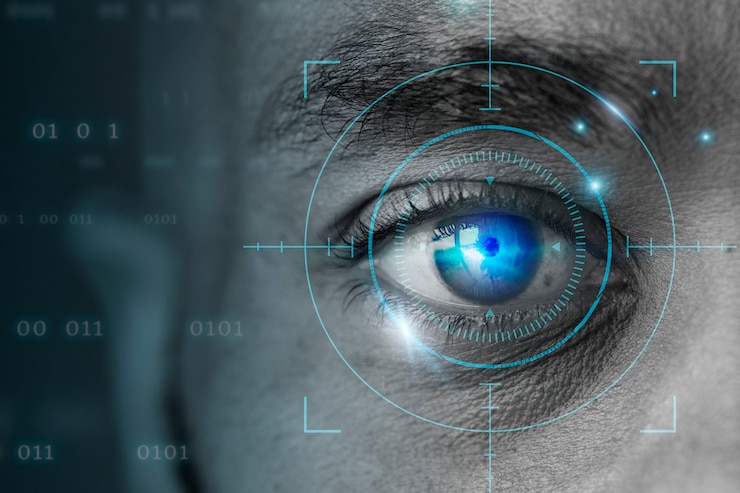Technology In Senior Care: Innovations For Aging Gracefully
5 Mins Read
Published on: 19 April 2023
Last Updated on: 03 April 2025

toc impalement
Our health needs change as we age, and senior care becomes vital to ensuring a comfortable and fulfilling life. With the technological advancements we see today, a significant transformation in how aged care is delivered has occurred. Among these advancements, many highlight the benefits of assisted living, which offers seniors a safe, supportive environment with access to medical care, social engagement, and daily assistance.
In this article, from remote monitoring to wearable devices, we delve into the various ways technology is used to enhance seniors’ lives, provide peace of mind to caregivers, and promote healthy aging.
Remote Monitoring for Senior Care
Remote monitoring systems allow caregivers and healthcare professionals to keep track of seniors’ health and safety in real-time, even from a distance.
These systems typically include sensors, cameras, and wearable devices that collect and transmit data to a central monitoring station or mobile app.
You can install smart home devices to detect falls or changes in activity patterns, such as prolonged periods of inactivity or wandering. These devices can send alerts to caregivers or healthcare providers, enabling them to intervene promptly in an emergency.
Pro Tip: Choose a system that is easy to use, reliable, and offers robust security measures to protect privacy and data.
Enhanced Communication and Socialization

Isolation and loneliness can harm seniors’ physical and mental health. Technology has enabled seniors to stay connected with their loved ones and the broader community, reducing social isolation and improving their overall well-being.
Social media platforms, video calling apps, and messaging services enable seniors to connect with friends and family, even if they are physically apart. They can share photos, videos, and updates, participate in virtual events, and join online support groups.
Technology has also facilitated access to educational and recreational resources for seniors to provide opportunities to continue learning, exploring new hobbies, and staying mentally stimulated, such as:
- Online classes.
- Virtual tours.
- Digital libraries
Virtual reality (VR) and augmented reality (AR) technologies have also been utilized to create immersive experiences that promote cognitive function and memory recall in seniors.
Pro Tip: Embrace technology and provide seniors with training or support if needed.
Telehealth and Telemedicine
Telehealth and telemedicine have emerged as game-changers, especially during COVID-19. These technologies allow seniors to receive medical consultations, monitoring, and treatment remotely, reducing the need for in-person visits and minimizing the risk of infection exposure.
Telehealth Services typically include:
- Virtual appointments with healthcare providers, remote monitoring of vital signs, and electronic health records (EHR) management.
- Consultations from doctors, discussing health concerns, and receiving medical advice from the comfort of their own homes.
- Healthcare providers can keep track of seniors’ health conditions, medication adherence, and fall risk assessment, among other things, in real-time.
Pro Tip: Telehealth and telemedicine can provide convenience, accessibility, and timely medical care for seniors, especially those with limited mobility or residing in remote areas.
Innovative Home Technology for Senior Care
Smart home technology has become increasingly popular when sourcing senior care solutions, offering seniors the ability to age in place safely and comfortably.
These technologies include a range of devices, like smart thermostats, bright lighting, intelligent locks, and smart appliances connected to a central hub. They can be controlled remotely via a smartphone or a voice assistant.
Smart home technology can provide seniors with enhanced safety features, such as:
- Automatic lighting that can be programmed to turn on and off at certain times or motion sensors that can detect falls or unusual activities.
- Smart locks that can be remotely controlled, allow caregivers or healthcare providers to grant access to the home without physical keys.
- Smart thermostats can be set to maintain a comfortable temperature.
- Smart appliances can simplify tasks like cooking or cleaning.
Pro Tip: When implementing smart home technology for senior care, consider the specific needs and preferences of the senior. Involve them in the decision-making process and ensure the technology is user-friendly and easy to operate. Regularly check and update the devices to ensure optimal performance and security.
Assistive Technologies for Daily Living

Assistive technologies are designed to help seniors with physical or cognitive limitations perform daily tasks independently and safely.
These technologies include mobility aids, medication management systems, hearing aids, vision aids, and adaptive tools for eating, dressing, and grooming.
- Mobility aids, such as walkers, canes, and wheelchairs, can provide support and stability for seniors with mobility issues, allowing them to move around their homes or communities more efficiently.
- Medication management systems, such as pill dispensers with alarms or reminders, can help seniors adhere to their medication schedules and prevent medication errors.
- Hearing aids and visual aids can improve seniors’ communication and sensory perception, enhancing their quality of life.
- Adaptive tools, such as utensils with larger handles or clothing with Velcro closures, can make eating, dressing, and grooming easier for seniors with dexterity or cognitive challenges.
Pro Tip: Educate seniors on using and maintaining assistive technologies to ensure their effectiveness and safety.
Caregiver Support Tools
Technology has also introduced various caregiver support tools. Utilised by professional caregivers, such as those who provide in-home care or work at assisted living facilities in orchard valley at wilbraham, for example, these tools assist caregivers in managing the care of their senior loved ones. They can help caregivers stay organized, track medications, monitor health conditions, and communicate with healthcare providers.
Caregiver support tools can include mobile apps, online platforms, and wearable devices that give caregivers real-time information about their seniors’ health and well-being.
For example, medication management apps can send reminders for seniors to take their medications, and caregivers can track their adherence to medication schedules.
Pro Tip: Regularly communicate with healthcare providers and involve them in the care plan.
Franchise Opportunities
Elder care franchises offer a business model that combines entrepreneurship with a mission to provide high-quality care to seniors in need.
What’s in it for the Franchisee?
- Training
- Support
- Resources
What is an Elder Care Franchise?
Depending on the franchise model, it can offer a range of services, such as in-home care, assisted living, memory care, and hospice care. The benefits of owning one include the following:
- Comprehensive training programs, marketing support, operational guidance, and ongoing support to ensure the business’s success.
- An established brand, proven business model, and support network.
Pro Tip: Thoroughly research different franchise options, review the franchise agreement and financials carefully, and seek professional advice if needed.
Ensure the franchise aligns with your values, goals, and local market demand.
Closing Thoughts
Technology has revolutionized senior care, providing innovative solutions to help seniors age gracefully and maintain independence. And as we continue to advance in technology, the possibilities for senior care are becoming endless.
So, why wait? Start exploring the world of technology in senior care and gracefully unlock the benefits of innovative solutions for aging. With the right approach and utilization of technology, seniors can continue to live with dignity, independence, and grace in their golden years.
Read Also:


















Comments Are Closed For This Article